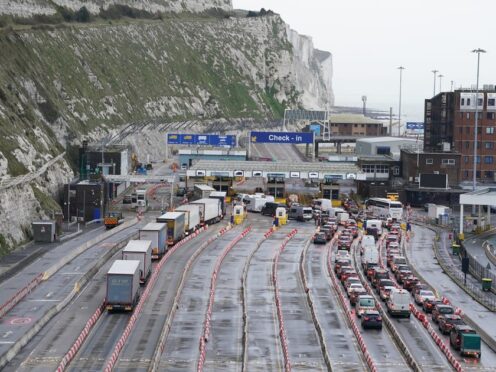New post-Brexit border checks have come into effect amid concerns they will lead to disruption and higher food prices.
Food suppliers have warned that the checks, known as the Border Target Operating Model (BTOM), will “increase food prices and reduce consumer choice” and impose “impractical” requirements on businesses.
Under the new scheme, animal and plant products from the EU deemed “medium-risk” or higher will face physical, documentary and identity checks at the Port of Dover and the Eurotunnel.
Importers will also need to pay up to £145 to bring such products into the country, with the fee intended to cover the cost of operating the border control posts introduced after Brexit.
Earlier this month, the Cold Chain Federation urged the Government to once again delay introducing the checks, with chief executive Phil Pluck saying the BTOM was “a broken model”.
He said: “Without listening to the experts, the Government will seriously damage business confidence in the UK and add costs to consumers’ weekly shop.”
The Government has said the checks will only increase food prices by 0.2% over the next three years, which farming minister Sir Mark Spencer told MPs on Monday was “a small price to pay for making sure that we are safe and protected” and negligible compared to the £12 billion cost of an outbreak of foot and mouth disease.
But Labour MP Stella Creasy told the Commons that the impact could be significantly higher, and described the measures as a “Brexit border tax” that could add £8 a month to the average food shop.
Ministers have insisted the checks are necessary to protect the UK from diseases such as African Swine Fever, which is widespread in some parts of Europe.
Cabinet Office minister Baroness Neville-Rolfe said: “It is essential that we introduce these global, risk-based checks to improve the UK’s biosecurity. We cannot continue with temporary measures which leave the UK open to threats from diseases and could do considerable damage to our livelihoods, our economy and our farming industry.
“We have listened to all parts of industry every step of the way and will continue to support them to implement these changes as smoothly as possible.”
The Port of Dover has said the new checks will not create additional delays at the port itself as they are carried out at a separate facility in Sevington, near Ashford.
On Tuesday, the Government also announced two pilots to test whether checks could be carried out away from the border, and if new technologies could be used to reduce the number of checks needed.
